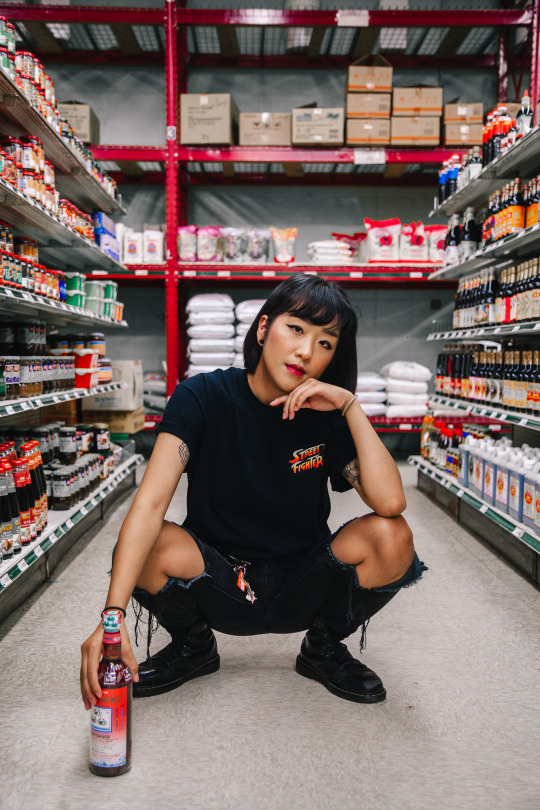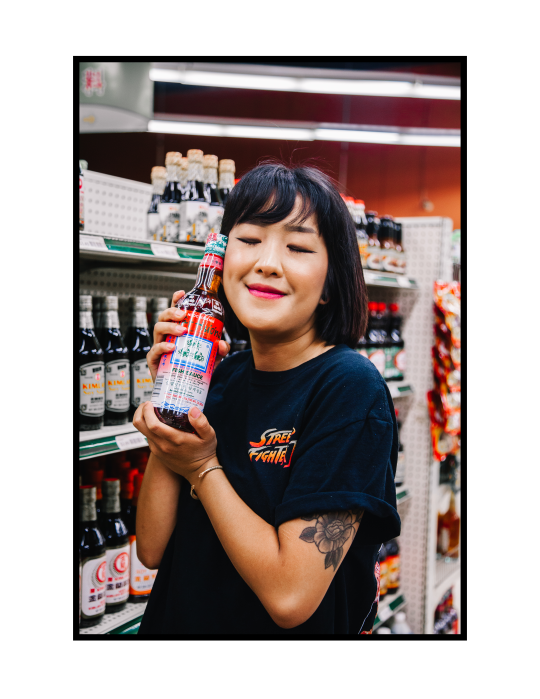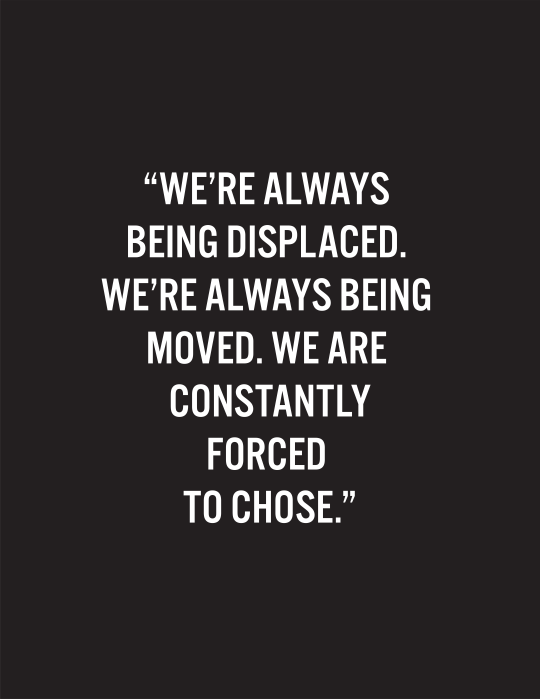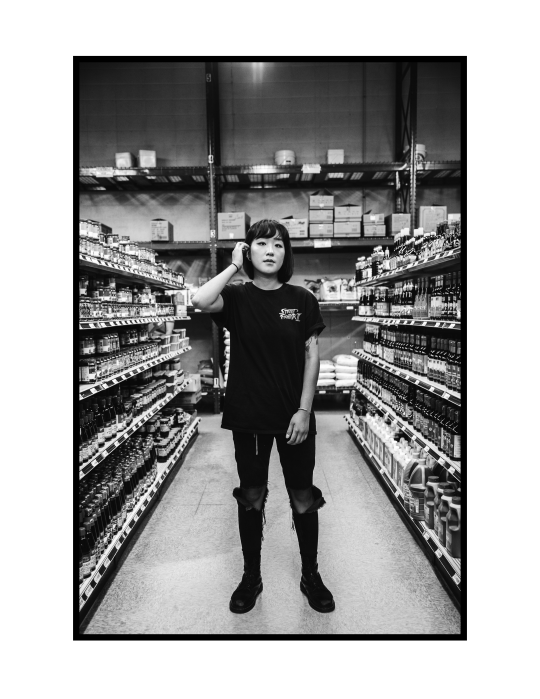#look I 100% support the usage of the word queer and use it myself
Explore tagged Tumblr posts
Text
When I see people complain about “baby queers” and say shit like “respect your elder queers” I feel like we’re bringing back the boomers vs millennial + gen z argument
#radio static#serious stuff#look I 100% support the usage of the word queer and use it myself#but I gotta say ‘baby queer’ sounds like an entire slur to me#not for the queer part but for the baby part#if you call me a ‘baby queer’ I will not hesitate to fight you#now please stop with the whole ‘respect your elders’ shit im seeing in the queer community nowadays
1 note
·
View note
Text
Kaja - August 22nd, 2018

Me: All right. Session 2. I'm here with Kaja Vang. Thank you for allowing me to interview you and hear your stories and your experiences of being Queer and immigrant while living and working and making home in Minnesota. Can you tell me how you received your name? Kaja: My mom said that my grandma had a dream and it was filled with a lot of fireflies. She just woke up and told my mom 'you're gonna name your kid Kab Ntsha.' That's how you pronounce it in Hmong. Kab meaning Bug, Ntsha meaning Light. And my mom was like 'OK cool.' And then she gave me my middle name which is Mindie. But my grandma basically named me.
Me: Have you ever revisited that story with your family to confirm that? Kaja: When I was a teenager, yeah. So my grandma passed this past winter, so I wish I took the time to actually talk to my grandma and figure out how did she specifically came up with my name. Because memories and words aren't always 100% what my people say. My mom is super dramatic sometimes. So when I was little when I first entered the academic world, my teacher couldn't pronounce my name, so they came up with Kaja, I just went with it. Then I was like, 'is that how I pronounce my name?' It sounded way easier. So I'm like 'OK cool whatever.' And then when I was transitioning into my freshman year in college, I was like 'oh I really want to reclaim my name and make sure people say it right.' And then I was talking to this white boy. He's like, "What's your name?" I'm like 'It's Kab Ntsha.' He's like 'Oh, ganja like weed?' And from that point I'm like 'nope, zip, I'm going with Kaja, pronounce my name wrong. I don't give a shit.' I only correct you if I love you dearly and you're a part of my life and I want that to be a thing. But general strangers, the youth that I work with, they sometimes call me the wrong name that sounds similar to Kaja. And people always question 'Oh is that how you say your name in Hmong?' And I'm like, 'no but I'm not trying to teach you right now.' Me: How have people mispronounced your name? Kaja: They call me Kaia which is like some white European shit. It's K-A-I-A instead of the J. They call me Kesha. Me: No. Kaja: They call me Tasha. Me: Nahhhh. But The "T"?! Kaja: Right? But that's the general gist of what people call me. And I just don't want to correct them unless I really care about them. Me: How do you identify? Pronouns et al? Kaja: I identify as a nonbinary and Queer Hmong writer. I write a lot. I'm pretty gay. Me: You kind of already touched on this but where's your family from? Kaja: So they are technically from Laos. I don't know my dad's history, I mainly know my mom’s. She grew up in the refugee camps in Thailand. Thailand and Laos is where my family is from. Me: And what brought them to Minnesota? Kaja: Colonialism. White supremacy. The U.S.-Vietnam War. My mom was born in 1974, so she grew up in the middle to end-ish of the Vietnam War. My mom's the oldest in her family and she had I think two younger brothers at that time when my grandma decided to leave Laos to go to the refugee camps in Thailand. She left my mom and her younger sister behind. So my mom and her younger sister had to basically leave. Someone ended up taking them to a refugee camp somewhere. I'm not sure if it's in Laos or Thailand. My mom was like 5 or something. She found aunties at the refugee camps and every morning before the sun rose, she would exit the refugee camp and then knock on neighbors’ doors and beg for food and she would come home, come back to the refugee camp and feed her younger sister. All the aunties kept telling her that her mom didn't love her, that she abandoned her and her father left as well. My granddad left way before my grandmother left to go to another refugee camp. But eventually a couple of years later, my grandpa came back and realizes she's his daughter, tells her to leave with him. And the whole family got reunited in the United States again. Me: Wow. I’m holding that for you, that's really heavy and hard to recall. My family had a similar experience but we were never displaced from our homelands. Thank you for sharing that. And what has kept them and yourself here? Kaja: I think the hopes and dreams of living a better life. For my parents, this is what they've always thought the U.S. would be. A place you can make it on your own and have your own business and be wealthy in terms of what Hmong immigrants think is successful. In my eyes, they're super successful. They have always thrown themselves into new experiences. So I grew up in a grocery store that my mom and dad got handed down from shady ass uncles. My mom and dad just kind of winged everything and learned everything about business by themselves. And they've always pushed me to be super innovative, creative, and to make a lot of money. And for me the reason why I'm here is because I'm about community. I found people who love me for who I am, and really support me and my journey of finding and expressing my authentic self. And that's why I'm here. Me: Would you want to stay in Minnesota? Kaja: For the time being, yes. I’m pretty sure this is an excuse for myself, but my parents are transitioning from owning a grocery store and then having the state buy the land because they want to pave a highway through it and do this man-made sewage lake thing.

Kaja: So then my mom and dad then purchased another commercial building a few miles away from the original one and this was a transitioning time my mom got her hairstyling license. And we bought this commercial building with the money that the government gives and my mom opened up her own beauty salon. And so right now, business has been going down and instead of renting out the open spaces in the building, my dad decided to renovate the middle space and make it a grocery store again. And so right now I'm kind of stuck helping them. Feeling obligated to be here for them still. But I mean I would like to move elsewhere and experience what life could be or how community looks like outside of Minnesota. Me: Hmm. East Coast then, maybe? Kaja: I haven't been there as an adult. I've only been to New York when I was a teenager. Me: What do you do for a living? Kaja: I work at a homeless drop-in center for youth between 16 and 23. I'm basically a social worker that stays in one spot. I don't leave the building ever, so I just do a lot of case management stuff or I build relationships with youth and provide them basic needs. But outside of that stuff that I do for a living that I don't get paid for, I do a lot of community organizing but not in terms of what the white structure of what community organizing is. I write and hope that would be something I can get paid to do one day. But I'm still trying to figure that out. Me: Next question is what gives you joy? Kaja: Gives me joy? Off the top of my head, I think puppies and babies. That gives me joy as well as connecting and getting to know more Queer and Trans folks of color as well as seeing how my parents are slowly learning and shifting their verbiage of talking about Queer and Trans Hmong people. My mom and dad are always using the excuse that they're too old and can't learn anything new, relying heavily on their kids. Just seeing the initial moment where I told my mom that I'm Queer. She's been referring to my partner as my partner instead of my friend. Slow steps. And that's cool with me. And that brings me a lot of joy, intermingled with a lot of frustration and anger. Good food brings me joy. Eating with other people brings me joy. I hate eating by myself. Me: What does Queer mean to you? I'm going to ask you to elaborate on your definition. Kaja: Queer. It means freedom or space to invest in yourself where you're liberated from the constraints of who you should be. So before I came out or identified as being Queer, I wondered if I was bisexual, and then was like ‘nah, bisexual doesn't feel like me, doesn't feel good to me.’ And then I wondered if I’m pansexual? Am I just attracted to people's personalities? And I'm like ‘nah, that doesn't feel good to me.’ And coming across the word Queer and having a community to reclaim that word again felt right. And it didn't feel too constraining or too rigid, but rather I get to define what Queer means to me. And you might have a different definition and that's cool. I don't mind that. But to me, it just means I'm able to move freely in my journey of discovering all of my identities and how that affects me in the ways that I navigate life. Me: What do you like or don't like about the mainstream definition? Kaja: I don't like white Queers. They're terrible. I have a couple of co-workers who are white cis gay men who say stuff like, "Back in my day, the word Queer was horrible. I don't know why you young kids are using it now." And I'm like ‘ok, to each their own, whatever. Don't judge me. Don't judge anyone.’ And then to the younger Queers or Queers my age, the mainstream usage of it just seems too academic where you have to have the right definition of Queer. And there is no fucking right definition of Queer. And even if your definition doesn't match, you're shunned. Using the word Queer in the mainstream way just seems so full of privilege and whiteness and I don't like that.

Me: Amen. Affirming all of those things. How does your family's culture define Queer? Kaja: YIKES. Me: If they can? Kaja: It's like an intermix of adopting the english word 'gay' to describe all types of Queer relationships and Queerness. Using slang terms. I don't know how to say it correctly, but it's a word that people have adapted to describe Trans women in community. But that's a really negative context that they use it in. It's just also kind of not spoken about. We don't talk about it. We don't acknowledge it. We pretend that Queer and Trans Folk people have never existed before and people think you're just crazy and that you need to find yourself a good man or woman then you'll be OK. I can't describe it in words but rather like in feelings of what Queerness means to the Hmong Community. A lot of shame and guilt and a lot of gaslighting that happens. Like an out of body experience of where you're like ‘Oh am I really Queer?’ But we don't have a word for it. It's shameful. So they think I'm just crazy. So I should probably marry a man.

Me: Last question before we get kicked out of this booth! It's a lil long though. If you could address the most influential public figures and decision makers in the state right now, what would you say about improving the standard of living for someone like yourself in Minnesota? Kaja: Well I don't know the academic term, but the health care where they don't bill you separately and you never meet your deductions and so you have to pay out of pocket for your health care. Universal health care that's affordable. Affordable in terms of we're not sacrificing X Y and Z to pay off our health care bills. We need health care that is encompassing all identities and all genders and all needs so we don't always have to go to specialty doctors and having to pay more and take the chances to cover it out of pocket. Kaja: Housing. Having a more sustainable way of providing housing for folks. Because homelessness is a huge issue here and people always go 'well why don't they work? Then they can get a place. Why isn't there enough public housing?' But there is enough public housing. The thing is we don't provide support to make that housing sustainable for them and we're only worried about if they're going to make enough money on time to pay for rent. It's more than that. It also includes mental health that affects their stability in housing. It also affects what barriers do people have to go through, especially being Queer and Trans and folks of color, to get jobs that pay you well and pay you enough so that you're able to have sustainable housing and that you don't always have to move here and there. And at the end of your lease, if your rent has gone up, you don't always have to find a new place, you know? We're always being displaced. We're always being moved. We are constantly forced to choose. Choose to live in a communal space where we're sharing a house with people, like 6-8 people in one place. And it's not like I only want my own house or my own space, but instead I want that to be a choice rather than out of necessity. Where you have Queer and Trans folks of color having to pool money together, having to share the little resources that they have to be able to support one another. That shouldn't be a thing. It should feel like a choice. But we're doing it out of necessity and survival. Put more Queer and Trans people in higher positions instead of assessing their background in education and experience and them not being good enough for those positions. Or the worry or the threat that we pose as Queer and Trans folks of color when we're trying to get hired for a supervisor position. It's not a threat to you and your power for the company to hire more Queer and Trans folks of color in a higher position.

Me: Well it challenges a power structure, that's why they don't do it. Make us the public figures and decision makers? Kaja: Hell yeah. Especially if you're working with Black and Brown youth, don't you think that? Me: They would respond a little more if they recognized themselves in the people in positions of power?
Kaja: Yeah. Like, why would you hire a white person to fill a role who doesn't reflect the population you’re serving? Me: Or does it? Kaja: Oooooh. Me: On that note. I think that is really awesome. Thank you Kaja!

0 notes